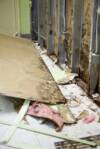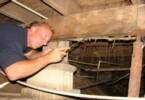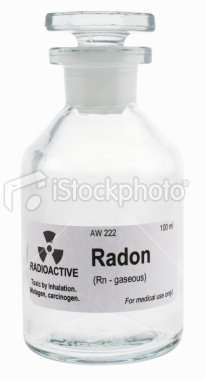Optional Services
INSPECTION SERVICES
PHONE: 860-849-1435
If you have a well or are concerned about the possibility of lead in your water, you should have your water tested. The US EPA and Connecticut Department of Public Health (DPH) recommend that private drinking water supplies be tested regularly, In fact, the DPH suggest that you have your well tested annually “to be certain of the general quality of your well water.” Annual testing for the more common contaminants would include such factors as: total coliform bacteria, nitrite/nitrate, Ph, sodium, turbidity and color. Also, depending on other environmental factors, you should consider testing for other more serious contaminants, both manmade and natural.
The State further suggests that the “best times to test are usually after a spring or summer rainy period or after repair or replacement of your well, pumps or water pipes.”
However you choose to test it, it is important to start early and keep good records for reference. Include the date and results. Changes in your water characteristics may point toward a developing water quality problem.
HPI Inspection Services offers a water quality testing program where we collect water samples using approved methods, deliver them to a state certified laboratory, and report the results back to you. Depending on your situation, we offer several different test options.
Radon is a colorless, odorless gas that comes from the breakdown of naturally occurring uranium in the soil. Radon can be found anywhere in the country. The gas vents up from underground and can become concentrated in the lower levels of a home.
Radon is considered a problem because it can cause lung cancer, and is considered by the Surgeon General to be the second leading preventable cause of lung cancer after cigarette smoking.
The EPA and Surgeon General recommend that all homes be tested for radon.
Testing for radon is the only way to find out if it might be a problem in your home. The testing process is not complicated, and is non-intrusive and inexpensive.
HPI Inspection Services can conduct an approved real estate transfer radon test for your proposed new home purchase.
Should radon levels be detected at or above the action threshold of 4 pCi/L [picoCuries per liter], there are mitigation systems available to reduce the amount of radon in your home to a safe level.
Mold spores are present in nearly every home. They enter your home through windows or air conditioners or are carried indoors on your shoes and clothing. Once inside, spores only need two things to colonize: a source of moisture and something to feed on. Your home has plenty of both. If there’s trapped moisture, a leaky pipe, or an overly moist or flooded basement or bathroom, mold is able to thrive, feeing on carpets, wood, fabrics and other common materials. It takes less than 24 hours to establish a new colony. There are many different types of mold, ranging from common to toxic. In concentrated amounts, the allergens that molds release can cause allergic reactions. Depending on the individual, any type of mold can cause adverse reactions, with the very young, elderly, and immune compromised being at highest risk.
Should the need arise, HPI Inspection Services can recommend an independent, qualified environmental inspector, not affiliated with HPI, to inspect, report and render an expert opinion on your concerns. These additional services can usually be scheduled to be performed the same day as the basic home inspection.
.
Termites as well as carpenter ants, powder post beetles and carpenter bees can invade your home, often causing considerable damage. Their presence can often only be detected by a trained eye. Even if a home has been previously treated for pests, a current inspection can be used to determine if the treatment program is up to date. Part of a successful treatment program is to have regularly scheduled inspections to monitor pest activity. Make sure to ask the seller for a copy of any pest service contracts or service plans that they might have.
The basic home inspection generally does not cover wood destroying insects and organisms, although if damage is obvious it is pointed out.
It is strongly recommended that a specially licensed pest control professional be hired to perform this type of inspection.
HPI Inspection Services can recommend or arrange for an independent pest control company, not affiliated with HPI, to inspect your property. Usually this pest inspection can be scheduled to coincide with the home inspection. 




























Asbestos is a naturally occurring mineral. Its inherent fiber-like characteristics and ability to withstand heat once made it an ideal material to use in building products. Before restrictions were placed on its use, hundreds of building products, including insulation, roofing, siding, floor and ceiling tiles were manufactured with asbestos and are still in use today. We now realize that over time these materials can degrade or be disturbed during removal, releasing thousands of asbestos fibers into the air. Those fibers can permanently scar the lungs, leading to impaired breathing, lung cancer, and even death.
It is often hard to tell and easily missed which building products are a potential risk. If you live in an older home, are considering renovation or demolition work, or suspect that there are asbestos-containing products in your home, then you may want to consider having a licensed professional asbestos inspector inspect your home.
HPI Inspection Services does not do this type of work, but can recommend an independent licensed professional, not affiliated with HPI, who would be willing to help you. Often this service can be scheduled for the same day as the basic home inspection.
If your future home is served by a septic tank, you should consider a real estate septic inspection. Having your septic system inspected is an important and necessary part of the home buying process. Here are a few reasons for the inspection:
• Every septic system has a different life span. This life span can vary due to proper/ improper usage, soil conditions, water tables, and natural occurrences, as well as other variables.
Every septic system has a different life span. This life span can vary due to proper/ improper usage, soil conditions, water tables, and natural occurrences, as well as other variables.
• It is impossible to tell, based solely on the age of the system, what kind of condition the septic system is in.
It is impossible to tell, based solely on the age of the system, what kind of condition the septic system is in.
• Septic system failures can occur at any time. A septic installation or repair is often the most expensive home improvement a homeowner will ever have to make. The septic inspection will give the buyer an accurate assessment of the current condition of the system.
Septic system failures can occur at any time. A septic installation or repair is often the most expensive home improvement a homeowner will ever have to make. The septic inspection will give the buyer an accurate assessment of the current condition of the system.
• Many home buyers have no prior experience with septic systems. The septic inspection gives the buyer an opportunity to get educated on the basics of septic care and maintenance.
Many home buyers have no prior experience with septic systems. The septic inspection gives the buyer an opportunity to get educated on the basics of septic care and maintenance.
HPI Inspection services does not conduct real estate septic inspections, but can recommend or arrange for an independent septic contractor not affiliated with HPI to conduct this service. The septic inspection can often be arranged to be conducted on the same day as the basic home inspection.
It is highly recommended that the septic tank be pumped and cleaned at the time of the septic inspection. This allows for a more accurate inspection of the tank and its components. Often, it can be negotiated with the seller to have them pay the septic tank pumping fee.
Lead is a metal that was used extensively in home construction and renovation until it was found to be a health hazard. Two of the main uses of lead in the home were as a paint additive and as water pipes and water pipe solder. Today, lead is considered a toxic metal that may cause a host of damaging health effects in both children and adults. These effects range from behavioral problems and learning disabilities to damage of the brain, kidneys, nervous system or red blood cells.
Many homes and apartments built before 1978 when lead paint was banned ( Lead solder was not banned until the EPA’s Safe Drinking Water Act [amendment] of June 1986) still have lead paint on their walls.
Children and adults are likely to come in contract with or inhale high levels of lead dust either during or after a renovation. Young children like to put toys and their hands in their mouths.
Before you risk exposing your family to lead, find out if a hazard exists. If you plan on doing renovation, demolition or disturbing more than two (2) square feet of painted surface on a home built before 1978, consider testing for lead.
HPI Inspection Services can recommend an independent qualified lead professional, not affiliated with HPI, to inspect, review and report on your project. This lead inspection can often be scheduled for the same day as the basic home inspection.
As a final note, use only contractors and professionals certified in lead-free work practices, who follow strict rules when working with lead
Wood destroying insect inspection photo shown above, courtesy of Shur-Kill Exterminating NJ.
Photograph Acknowledgements
note:1 Due to the market area of this contractor, HPI does not utilize their services.
1
1










